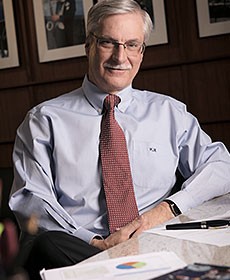The Klag Years: 1996-2004

After a dynamic decade, Dr. Levine stepped down as Division Director in 1996. The Department of Medicine’s then Chairman, Dr. Edward Benz, named Dr. Michael Klag to replace him. Dr. Klag had already built an international reputation in the epidemiology of cardiovascular and renal disease. Under Dr. Klag’s leadership, the Division continued to flourish with enhanced research and clinical programs, along with faculty, fellow, and staff development. The Division underwent important planned growth in faculty, areas of research, training, and interrelationships with other divisions in the Department of Medicine, other departments in the School of Medicine, and the Schools of Public Health and Nursing. During Dr. Klag’s tenure, the Division doubled in size and spread itself across four different sites—a challenging obstacle to unity. Dr. Klag gave high priority to divisional unity and brought all elements—research, clinical, teaching—“back to the table together.” This was critical for the health and future of the Division. Equally important, Dr. Klag championed equity in visibility, promotability, and reward structures for all faculty and staff.
The growth and development of the Clinician Educator Group under the leadership of Dr. Flynn, and with the support of Dr. Benz, was a major accomplishment during these years. In 1997, the Group size doubled with the additions of Drs. Carol Ann Huff, Redonda Miller, and Kimberly Peairs (who had each just completed a year as Assistant Chief of Service) as well as Drs. Gregory Prokopowicz, Mark Hughes, Jeffrey Magaziner and Joseph Cofrancesco, Jr. who had just completed his GIM fellowship. Dr. Bimal Ashar (1998), who is now the Medical Director of the Executive Health Program, and Dr. Spyridon Marinopoulos (2001), who is now the Director of University Health Services, joined soon thereafter. Subsequent recruitments to this Group have included Dr. Gail Berkenblit (from the Osler Housestaff) in 2002, Dr. Sarah Clever (from the GIM Fellowship) in 2003, and Dr. Rosalyn Stewart (from University of Maryland) in 2004. On October 16, 2001, the D. William Schlott Professorship in Clinical Medicine was established in honor of clinical and educational excellence provided by Dr. Schlott. Dr. Flynn was the inaugural recipient of this professorship.
By 2005, the Clinician Educator Group had achieved a major influence over the training programs of Johns Hopkins, with one-third of the faculty leading the Clinical Skills course in School of Medicine (three Firm Faculty leaders, and two Associate Program Directors). That year, both Drs. Flynn and Sisson won national awards from the Society of General Internal Medicine—one for program building, the other for creating a novel internet learning system.
Growth of the GIM research enterprise also continued under Dr. Klag who recruited seven alumni of the GIM Fellowship Program to faculty. Dr. Jeremy Sugarman, an internationally regarded expert in bioethics, was recruited to the Harvey M. Meyerhoff Chair of Bioethics and Medicine after a successful career at Duke. Dr. Jeanne Clark was recruited to build a program in the clinical epidemiology of fatty liver disease, obesity, and related conditions. Dr. J. Hunter Young, a former Hopkins Assistant Chief of Service mentored by Dr. Klag, joined the faculty with a focus on the genetic and molecular epidemiology of hypertension and related conditions. Dr. Gail Daumit, who originally came to Hopkins as a Robert Wood Johnson Clinical Scholar, was recruited to pursue research in the epidemiology and treatment of medical conditions in adults with severe mental illness. Dr. Ebony Boulware was recruited to build a health services research program in transplantation, with particular emphasis on meta-analysis, cost-effectiveness analysis, and systematic literature synthesis. Following a Greenwall Foundation Fellowship in Ethics, Dr. Mary Catherine Beach continued her work in the area of physician-patient communication and relationships. And Dr. Geetanjali Chander was recruited to build a research program in the area of substance abuse, HIV, and hepatitis.
In 2000, Dr. Klag assumed the additional responsibility of serving as Acting Chair of the Department of Medicine, a position he held until Dr. Myron Weisfeldt was named Chair in 2001. Subsequently, Dr. Edward Miller, Dean of the School of Medicine, named Dr. Klag to become the Vice Dean for Clinical Research—a challenging post under any circumstance, but especially so in the aftermath of the sanctions against the School of Medicine levied by the Office of Human Research Protections. While holding down the Division, Dr. Klag also managed to resuscitate the clinical research enterprise of the School and establish an entirely new system for institutional review.
By 2004, the dual role had become too demanding. Dr. Klag stepped down to focus on his role as Vice Dean, only to be named a few months later as Dean of the Bloomberg School of Public Health. From 2004 to 2005, Dr. Levine stepped back in to serve as Acting Division Director.
